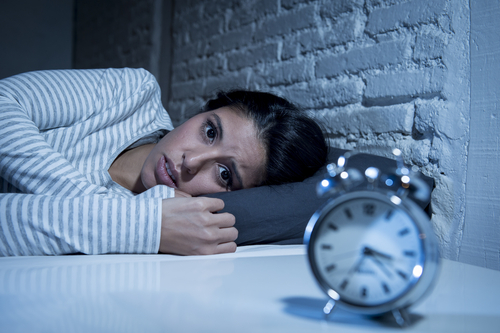Free 2-Day Shipping on Orders Over $50

While many symptoms of anxiety are cerebral in nature, taking the form of racing thoughts and fears about the future, anxiety can also manifest physically.
This fact can make anxiety even worse. If you tend to fixate on your body as part of your anxiety, the very symptoms of anxiety can make you feel more anxious. You may find yourself asking “What if …?” about strange sensations you are experiencing.
Of course, if you have any serious concerns that you may have physical health problems, it is always wise to talk to a medical professional.
Nonetheless, a surprising number of physical symptoms can sometimes have an entirely psychological root. Following are some common and startling ways that anxiety can manifest in your body.

Many people experience anxiety as gastrointestinal distress. This can take the form of feeling nauseous, experiencing heartburn, or even needing to run to the bathroom with diarrhea.
The Harvard Medical School explains, “A troubled intestine can send signals to the brain, just as a troubled brain can send signals to the gut. Therefore, a person's stomach or intestinal distress can be the cause or the product of anxiety, stress, or depression.”
Speaking of running to the bathroom, it isn’t just your colon which likes to dump its contents when you are anxious. Your bladder may also try to empty itself rapidly, resulting in repeated trips to the bathroom with the urgent need to urinate.
When you are anxious, you can experience what feels like extreme swings in body temperature. One moment, you may feel hot and flushed, while the next you might be shivering under a blanket. You could also find yourself sweating profusely, regardless of whether you feel hot or cold.
During an anxiety attack, or even as a result of low-level anxiety throughout the day, your heart may beat more rapidly than usual. You may also find yourself more aware of your heartbeat than usual because it is beating harder. It may be easy to detect your pulse throughout your body, or even impossible to ignore it.
Sometimes, your heart may also miss a beat. While this can feel alarming, if there are no underlying physical causes, the symptom is harmless.
Many people report that it feels harder than usual to take a breath while anxious, or even that doing so is painful. The chest pain is possibly the result of tight muscles (see below). The symptom can be quite stubborn even during low-grade anxiety. Despite how disturbing it can be to experience, you are getting plenty of air. It just feels like you aren’t.
Anxiety can cause pain in different parts of the body for various reasons. For one thing, when people are anxious, it is common for them to tense up without noticing it. This can lead to muscle tightness which is painful.
Anxiety is also inherently stressful. For some people, this can trigger other health issues to act up. For example, anxiety could lead to a migraine attack.
Feeling anxious can lead to shaking, tingling, buzzing, vibrating, or similar sensations throughout the body, especially in the extremities. There are many possible variations on these sensations.
It is very common for anxiety to lead to dizziness or light-headedness. This symptom will be most pronounced if you have a tendency to unconsciously hyperventilate when anxious because you feel like you cannot breathe.
One odd symptom of anxiety can be legs which feel shaky and weak. The shaky sensation is likely the result of extra circulation to your leg muscles in preparation for flight (as part of a fight-or-flight response). It can even feel similar to restless legs syndrome (RLS).
The “weak” aspect may come about when this has gone on for some time, stressing out your leg muscles, or as a psychological component (“My legs are shaky, therefore they are weak.”). Ironically, you may even collapse as a result when you get up to walk. Naturally, this can feel quite terrifying, yet it can still point toward anxiety as the underlying cause.
Other unusual symptoms of anxiety which can manifest physically affect your vision. As a result of adrenaline levels climbing, eye pressure can as well. This can lead to blurring vision. Some anxiety sufferers also report tunneling vision or other visual symptoms as well.
On a related note, some people experience the sense that they are viewing the world through a glass wall, and are no longer directly within it. This is known as the "fishbowl effect,” and is a form of psychological de-realization. The world feels "fake" or "faraway." It is likely that vision changes can make this psychological symptom more pronounced, as can some of the other symptoms on this list.
If anxiety is the root cause of your physical symptoms, the way to get relief is to treat the anxious state.
A helpful starting point is to talk to a healthcare professional to rule out anything serious. Ask questions about the physical symptoms of anxiety in order to understand them better and find them less frightening.
This can give you a start to psychologically distancing yourself from those symptoms. Just knowing that you are not in danger from the symptoms can by itself help you to fight your anxiety.
Meanwhile, you can work on treating other components of your anxiety. A variety of approaches may be useful here, depending on your exact situation and disposition. Some ideas to consider include:
Whatever approach you decide to take, remember that it takes time and patience to make lasting changes to your psychological and physical health. In the meantime, take heart in knowing that many seemingly alarming physical symptoms may simply point toward an anxious state of mind.
Enter your information below to apply 10% off to your first order. You'll love our supplements, we promise (and guarantee it)!